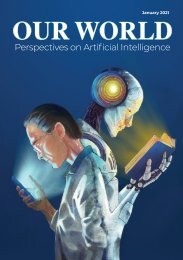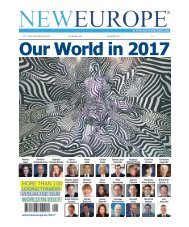Our World in 2018
Leading minds reflect on the state of our societies, and examine the challenges that lie ahead. An edition dedicated to generating ideas that will help form a new vision for our world.
Leading minds reflect on the state of our societies, and examine the challenges that lie ahead. An edition dedicated to generating ideas that will help form a new vision for our world.
Create successful ePaper yourself
Turn your PDF publications into a flip-book with our unique Google optimized e-Paper software.
How to Break
Korea’s
Barriers to
Social Mobility
By Ha-Joon Chang
When the South Korean military
killed hundreds of pro-democracy
protesters and laid siege to the
southwestern city of Gwangju in May 1980,
few people outside the city knew what was
happening. Martial law had been declared,
the already censored press was completely
gagged, and all communications with Gwangju
were cut off. The end of the 10-day siege
marked the beginning of a seven-year period
of military repression and terror under Gen.
Chun Doo-hwan, who outdid his predecessor,
Gen. Park Chung-hee, in terms of brutality and
corruption.
One generation later, millions of Korean
citizens took to the streets in dozens of cities
across the country for 20 continuous weekends
of “candlelight rallies,” from the autumn of
2016 to the spring of 2017. They called for the
impeachment of then-President Park Geunhye,
General Park’s daughter, for her part in
a scandal involving corruption, bribery and
abuse of power. This time around, the entire
world knew what was going on in South Korea.
The country’s advanced information
.
Smartphones turned front-line protesters
into videographers. Millions commented on
the political situation on Kakao Talk (a Korean
messaging service), Facebook and other social
media channels.
Technology alone is not enough to establish
true democracy. Not all technologically
NEW YORK TIMES
Ha-Joon
Chang
Ha-Joon Chang is
an economist at
the University of
Cambridge. He is the
author of “23 Things
They Don’t Tell You
About Capitalism.”
advanced nations have vibrant grass-roots
political engagement, and in many countries,
devices and software are being abused — used
for surveillance or to manipulate information,
while anti-democratic extremists spread
their views on the same platforms. Advanced
technology can enable democracy by giving
citizens more time and energy for political
engagement and by making corrupt political
practices like vote-buying more difficult.
However, what’s most important is constant
civic engagement — without that, democracy
withers away.
The popular “Asian values” thesis suggests
that Asians are culturally disinclined to
democracy because they favor the good of
the community over individual rights. That
is untrue: South Koreans have fought for
democracy throughout modern history.
In 1945, when the Japanese left after 35
years of colonial rule, no South Korean called
for the restoration of the monarchy. In 1960,
a mass protest against misrule and electoral
fraud ousted the republic’s first president,
Rhee Syngman. Throughout General Park’s
18 years of iron-fisted rule, students and
workers agitated and risked their lives for
democracy. In 1987, 19 days of violent street
demonstrations led by students, workers
146 2018 | OUR WORLD










